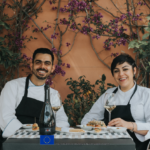Italy and Switzerland are neighbors and friends, there is an Italian wine market in Switzerland but needs improvement. Cincinnato interviews Rocco Lettieri
People on the web knows him as “Simpatico Melograno”, but Rocco Lettieri is much more than nice and funny man. For this reason, he has agreed to tell us more about Italian wines in Switzerland.
He has strong a background in the world of wine. What is more he is an expert of bread making and olive oil, which makes him one of the leading experts in the sector in Italy and Switzerland. What is more, in his professional history, he earned an Onav diploma and he covered the role of manager for the “Gold Guide” of the Luigi Veronelli Permanent Seminary (a guide who also managed to have it translated into Japanese).
Moreover, Rocco Lettieri has cooperated with many Italian and Swiss magazine specialized in wine (Civiltà del Bere, Food & Beverage, Vibo e Dintorni, Galatea, Welcome, TicinoVinoWein). Finally, he has been dealing with actual wine trading, overseeing wine export from Switzerland to USA (Dufour & Company di Boston) and to Japan (Winterose Japan e Vino Felice).
This is why we wanted to know from him more about the Swiss wine market and what are the possibilities for Italian products and specifically the ones from Lazio region.
According to your experience which was the prestige of italian wines in Switzland before the outbrake of Covid-19?
“Let’s say that the three countries having good wine imports in Switzerland are France, Spain and Italy. In particular, France for the great wines of Burgundy and Bordeaux as well as Champagne (Swiss imported as much champaign as USA did before the outbreak of Covid). Spain had a high demand of red wines. This happened also with Portugal with Madeira and dessert wines.In conclusion, Italy remains the main supplier of wine for Switzerland. In fact, 10 years ago, Veneto, Piedmont and Tuscany were the the major retailer. Nowadays, almost all the Italian territories are included in the Swiss wine lists. In addition, in the last two years the import of Prosecco has increased and there has also been a raise in the retailing of Moscato d’Asti.
Despite this, Swiss themselves source their supplies in the border areas. In particular, during weekends, because shopping for food & wine is very convenient once crossed the border. This is due to the subsidized taxation with VAT at 7.8% instead of 22%. In addition, the phenomenon of cross-border commuters has to be taken into account. More specifically, here 75,000 Italians enter and leave Switzerland to work, a number of this kind naturally creates important economic movements ”
Do you think things will change a lot in the post-covid period recovery?
“There is not much to say! Covid-19 has hit Switzerland strongly, also due to an initial underestimation. Afterwards authorities had to close all the hotels, which are among the most luxurious in the world. What is more the same destiny was the one of the restaurants. At that point, wine imports stopped. In fact, just supermarkets remained open and this meant that many producers, including Italians, saw payments delayed and inventories increased.
Openings were allowed only from March 2021. It will take time before the issue is resolved, because in Switzerland travelers consumption was crucial for the national economy; in particular, travellers from countries such as Germany, Belgium and the USA. In conclusion, we are still in a very difficult situation for both importers and distributors, difficult to say what will happen ”.
Is there a space for Italian wines in Switzerland? What about the ones from Lazio region? Does anyone know them?
“I would say no! I can say we have only begun to discover some Lazio wineries finding them in the wine lists and on the shelves during the last three years. In addition, this is because the ASTP (Associazione Sommelier Ticinesi Professionisti) and I managed to place wineries I already knew from previews export experience to the USA (e.g. Casale del Giglio, Sergio Mottura, Tenuta Pazzaglia)”.
According to your huge experience in the field, which are the most important features that Italian wine should exploit abroad?
“There are no magic recipes. In other words, the producers have to get a wriggle on, bringing the samples with them, along with the technical sheets in the local language. Furthermore, they must take advantage of new technologies and therefore focus on images and films, combine Italian beauty and style with the local language and invite stakeholders to come and visit the wineries and territories. There are no other alternatives, generally abroad Italy and Italian cuisine are liked, many also know that we have the greatest diversity in the world and they know us because there is no place in the world where there is not an Italian to work. “.






